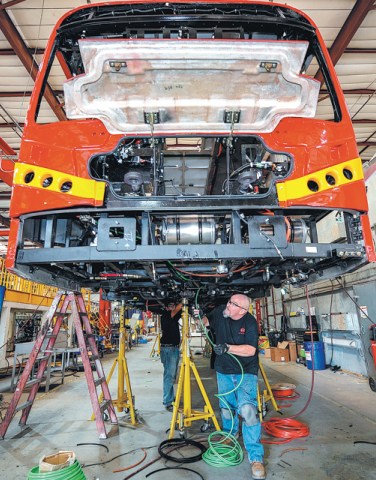
Workers install wiring in an electric bus at a BYD factory in Lancaster, California, in September 2016. (ZHANG CHAOQUN/XINHUA)
Treaty would provide protection for both countries' investment
Despite U.S. President Donald Trump's lambasting of a variety of trade deals, experts believe that a Bilateral Investment Treaty (BIT) between China and the United States could still be concluded in the coming years.
China and the U.S. accelerated BIT negotiations in the last two years of the Obama administration, but still fell short of reaching an agreement.
Colin Grabow, a policy analyst at Washington-based Cato Institute, said the good news was that U.S. Trade Representative Bob Lighthizer has not shut the door on the BIT, but indicated that there were still some issues to clear up before moving on to a BIT.
"So they can move on these issues… maybe the U.S. and China can get the BIT done by the end of Trump's four years," Grabow told China Daily ahead of Trump's trip to Asia. "That would be nice to see."
Asked at his confirmation hearing in March whether the Trump administration would pursue negotiations with China for a BIT, Lighthizer said the Trump administration places a high priority on utilizing a broad range of tools to ensure that China treats the U.S., U.S. exports and U.S. companies fairly with respect to trade and investment.
"We will be reviewing the full range of potential tools, including the U.S.-China bilateral investment treaty negotiation, to assess the best path for the administration to achieve this objective," he said.
U.S. Treasury Secretary Steven Mnuchin told the U.S.-China Business Council (U.S.CBC) in June that a BIT with China is on the Trump administration's agenda, even though it is not a top priority.
The Trump administration, after withdrawing from the Trans-Pacific Partnership (TPP), has been busy renegotiating the North American Free Trade Agreement (NAFTA) and the U.S.-Korea Free Trade Agreement, known as KORU.S., as well as reexamining other trade deals which Trump described as "horrible" or a "disaster".
Mireya Solis and David Dollar of the Brookings Institution noted in an Asia economic policy paper that it would not be easy to reach a BIT with China, but continuing the negotiations was important.
Kenneth Jarrett, president of the American Chamber of Commerce in Shanghai, said Trump should support the BIT because he prefers a bilateral deal, saying "it is a good deal for America".
In the past years, the U.S.CBC, which represents more than 200 U.S. companies, has called on both the Obama and the Trump administrations to conclude a BIT with China.
A BIT would provide protection for both countries' foreign investment. While U.S. companies would gain greater access to the Chinese market, especially in the services sector, the growing number of Chinese investors would also enjoy fair treatment in the U.S..


















































